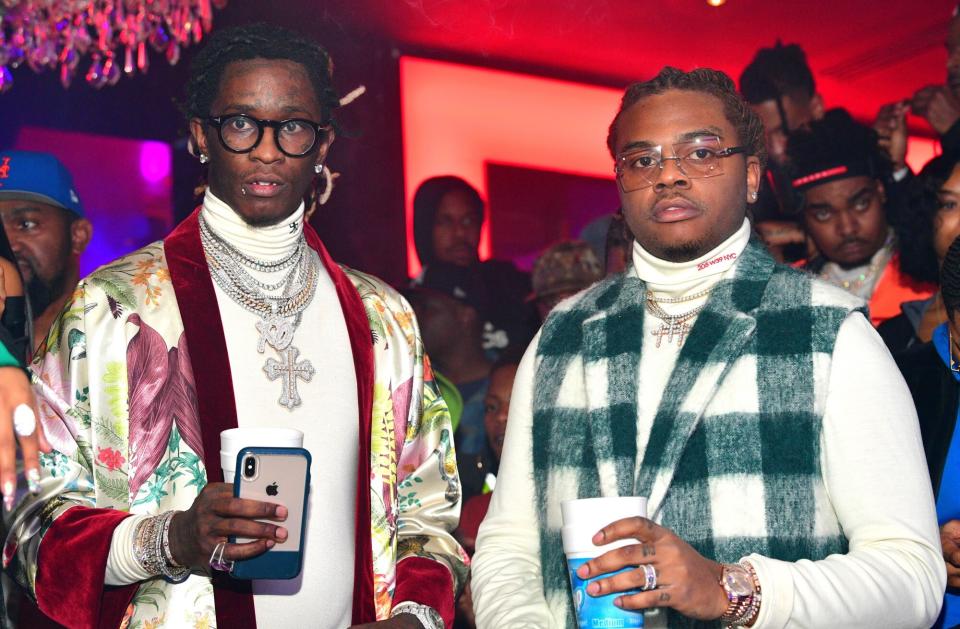California Bill Limiting Use of Rap Lyrics in Criminal Trials Signed Into Law by Gov. Gavin Newsom

- Oops!Something went wrong.Please try again later.
- Oops!Something went wrong.Please try again later.
- Oops!Something went wrong.Please try again later.
Monica Schipper/Getty for Bloomberg Philanthropies
California Gov. Gavin Newsom has signed a landmark bill restricting the use of rap lyrics as evidence in court, making California the first state to now have such a law.
Known as the Decriminalizing Artistic Expression Act, AB 2799 makes it harder for prosecutors and others to use "creative expression" as criminal evidence in court. In the case of rap, that expression can include lyrics or music videos, and even extends to "performance art, visual art, poetry, literature, film, and other media." The legislation passed unanimously in the California state Senate and Assembly, and the law will require a court to now "consider specified factors when balancing the probative value of that evidence against the substantial danger of undue prejudice," per CNN.
"Artists of all kinds should be able to create without the fear of unfair and prejudicial prosecution," the governor said in a Friday statement. "California's culture and entertainment industry set trends around the world, and it's fitting that our state is taking a nation-leading role to protect creative expression and ensure that artists are not criminalized under biased policies."
CA is the 1st state to ensure creative content - like lyrics & music videos - can't be used against artists in court without judicial review.
Thanks, @JonesSawyerAD59 for your work & @yg @KillerMike @tydollasign @Tyga @MeekMill @E40 @TooShort for your dedication to the cause. pic.twitter.com/cpOSCiHh0X— Office of the Governor of California (@CAgovernor) September 30, 2022
Musicians Tyga, Meek Mill, Ty Dolla $ign, Too Short, Killer Mike, and Recording Academy CEO Harvey Mason Jr. all attended the Zoom call where the Democratic governor signed the bill, which was unanimously approved back in August.
"The second time I witnessed the Governor of California sign bills that help our people … probation caps & bans on using rap lyrics in court "I RESPECT YOU" Thank you I understand the magnitude of the moves you make we need help in the system," Mill wrote on Twitter.

Prince Williams/Wireimage
Conversations around limiting the use of rap lyrics in court have been ongoing for years, and heightened this year with the Racketeer Influenced and Corrupt Organizations (RICO) Act charges against rappers Young Thug and Gunna and affiliates of their label, YSL.
The Fulton County, Georgia District Attorney's office cited multiple instances of lyrics and videos from the musicians as alleged evidence of their charges in an 88-page May indictment. Thug is facing charges of conspiracy to violate the RICO act and participation in criminal street gang activity, while Gunna was charged with one count of conspiring to violate RICO, under which individuals can be punished for crimes tied to a whole criminal organization. Gunna and Thug are expected to remain in jail, without bond, until their trials in January 2023.
As the BBC shares, over the past 20 years, hip-hop lyrics have been used as evidence in over 500 criminal cases in the U.S.
Several of Young Thug’s lyrics appear throughout the indictment pic.twitter.com/mCCxB08jB4
— philip lewis (@Phil_Lewis_) May 10, 2022
With California moving forward with its new law, some New York musicians are still supporting the Rap Music on Trial Bill, which was brought forward in another effort to limit "creative expression" as evidence in court and require prosecutors to provide "clear" evidence that lyrics are "literal, rather than figurative or fictional." The since-stalled Senate Bill S7527, which was passed by the New York State Senate, was backed by several musicians, such as Jay-Z and Fat Joe.
"Our lyrics are a creative form of self-expression and entertainment — just like any other genre. We want our words to be recognized as art rather than being weaponized to get convictions in court," Fat Joe previously told Rolling Stone."... I hope the governor and all the lawmakers in New York take our letter into consideration, protect our artistic rights and make the right decision to pass this bill."
Similarly, the RAP Act, also known as the Restoring Artistic Protection Act, was introduced in the House by U.S. Reps Hank Johnson and Jamaal Bowman back in July, when Johnson said in a release that "without further Congressional action, the freedom of speech and of artistic expression present in music will continue to be stifled, and that expression will be chilled, until the voices behind that protected speech are silenced."

